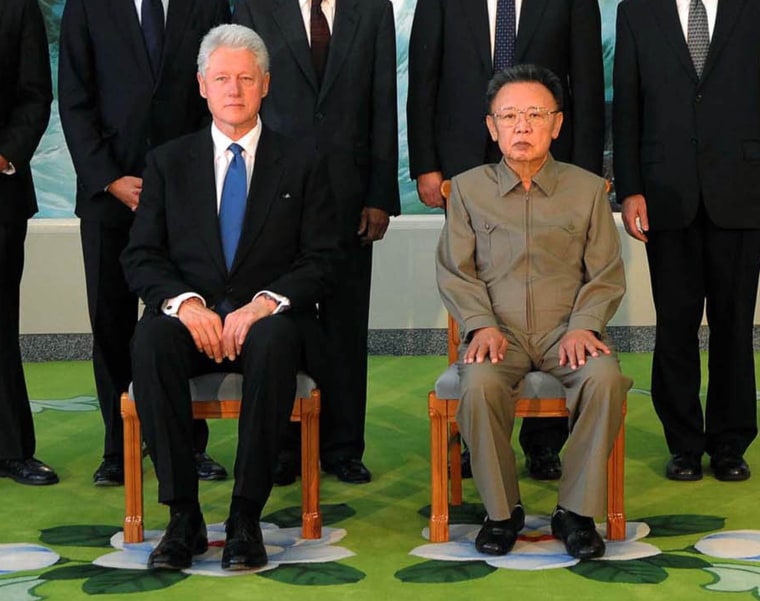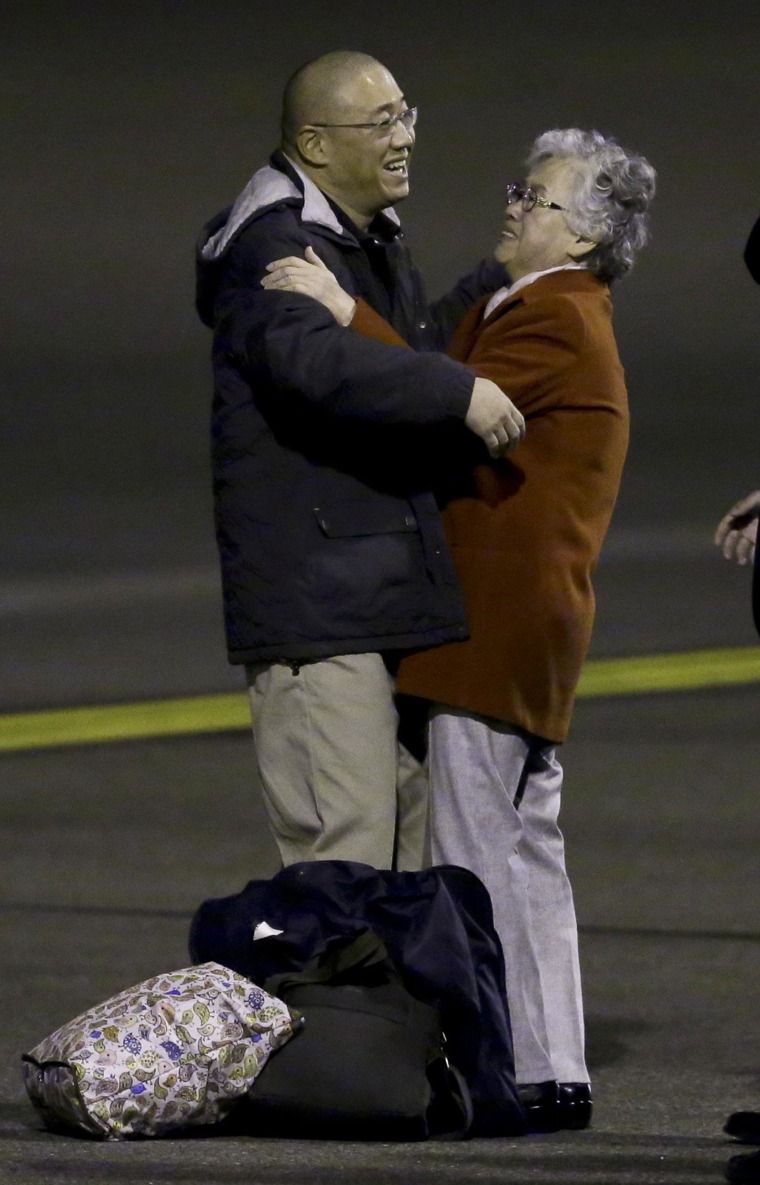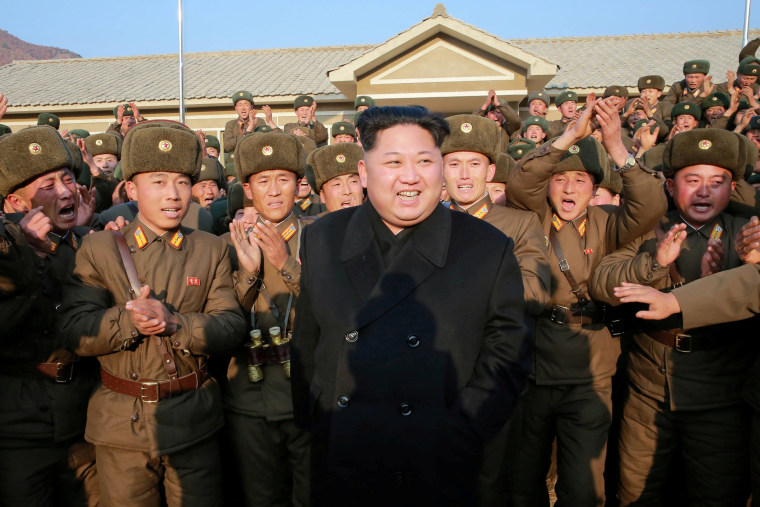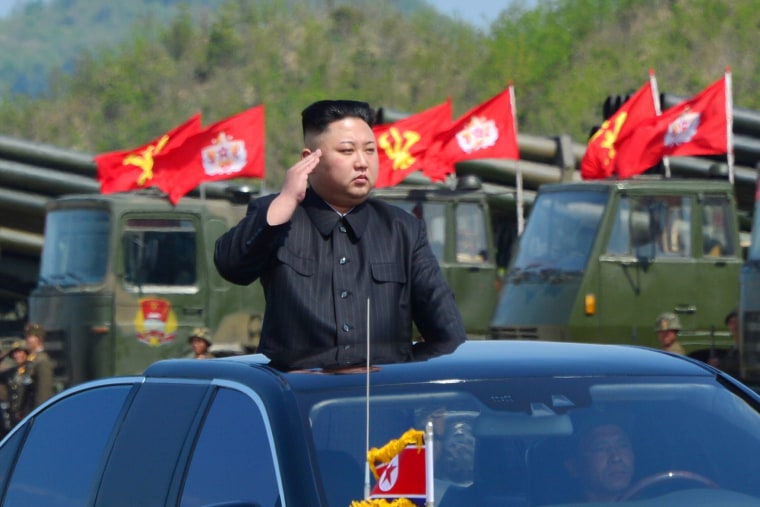SEOUL, South Korea — Kim Jong Un is detaining American citizens as human shields amid fears of a U.S. attack targeting his nuclear and missile programs as part of a new form of "hostage diplomacy," according to experts.
North Korea has long detained U.S. citizens to use as bargaining chips.
But unlike his father Kim Jong Il, the young dictator is using prisoners to protect himself rather than as a tool to bring the U.S. to the negotiating table, analysts said.
On Saturday, U.S. citizen Kim Hak Song was detained for "hostile acts against the republic," the state-run Korean Central News Agency announced. He had been working at Pyongyang Science and Technology University, it added.
And last month, North Korea stopped U.S. citizen Kim Sang-duk, who also is known as Tony Kim, at Pyongyang Airport as he was preparing to leave the country. Kim had also been teaching at that university before he was taken into custody.
Saturday's detention brings the total number of Americans held by the isolated nation to four, and comes amid worsening tensions between North Korea and the United States.
"Kim Jong Un is using hostage diplomacy as a part of his military and defense strategy with focus on preventing the U.S. from removing him from power as well as to prevent the U.S. from taking military options against North Korea, " Dr. An Chan Il, president of the World Institute for North Korea Studies and a former defector, told NBC News.
Dr. Koh Yu Hwan, a professor of North Korean studies at Dongguk University in Seoul, said that taking hostages remained worth its while for North Korea.
"Although such hostage talks don't usually lead to negotiation over missile or nuclear weapons ... the added numbers can certainly hamper and limit options the U.S. can take over North Korea," Koh added.
"Donald Trump is going to be played by Kim Jong Un who has handled this situation better than he has.”
John Nilsson-Wright, a senior research fellow in the Asia program at the London-based Chatham House think tank, agreed that Kim Jong Un's actions could be part of an effort to stop the U.S. military from attacking North Korea.
But he said it was more likely such moves were “grandstanding,” and not about bringing the U.S. to the negotiating table.
“The current situation is not a bad one for Kim Jong Un," Nilsson-Wright said. "He’s had a lot of airtime and the more he continues to test missiles and move forward with militarization, he can demonstrate his independence to the international community and present himself to his people as unbowed."
He added: "It’s poking a stick in [President] Donald Trump’s eye in a signal of defiance."
America has long since sought to put pressure on North Korea to stop its missile and nuclear tests that contravene United Nations sanctions — something Kim has ramped up under his leadership.
His regime has made no secret of the fact it is working on a nuclear-tipped missile capable of reaching America.
On Wednesday, Secretary of State Rex Tillerson said that the U.S. was not interested in "regime change." But he previously had suggested that military action against Kim's regime was "on the table."
Earlier this week, state-run North Korean media said "U.S. military provocations" — referring to drills carried out alongside South Korea — had left the region "close to nuclear war." On Friday, it also accused the CIA and South Korea of being behind a failed assassination plot targeting Kim Jong Un.
In the past, detaining — and then releasing — U.S. citizens has given Pyongyang leverage in negotiations with Washington or allowed the country to offer them up as goodwill gestures to the international community, experts say.

In 2009, Kim Jong Il pardoned and freed two detained American journalists after former President Bill Clinton visited Pyongyang, giving North Korea a fleeting moment of international legitimacy.
Five years later, Kim Jong Un released U.S. citizens Jeffrey Edward Fowle, Kenneth Bae and Matthew Todd Miller after James Clapper, then the director of national intelligence, made a secret visit to Pyongyang.
At the time, North Korean state media trumpeted that that three Americans were being released following the "repeated requests" of President Barack Obama.

"Such detention and then handing over after harsh sentencing and releasing after a high-level U.S. official is a carefully planned tactic North Korea use," Dr. Lee Jung Hoon, South Korea’s ambassador for North Korean human rights, told NBC News.
It’s “immoral,” and “shameless," the diplomat added. “But it is useful and they know it.”
Kim Jong Un has continued to detain American citizens, but experts note a shift in his tactics.
While Trump told Bloomberg News on Monday that he would be "honored" to meet the North Korean dictator, many analysts believe that Kim no longer even aims to hold talks with the U.S.
"This is North Korea's hostage diplomacy," Dr. Koh said. "They are like the human shields against the U.S. government with the ultimate goal of attention grabbing."
Lee So Yeon, president of New Korea Women's Union, an NGO for defectors, said American prisoners who were accused of "crimes against the state" were being used by Kim as a propaganda tool for a domestic audience.

"One stark difference between Kim Jong Un from his predecessors over hostage diplomacy is that he emphasizes publicizing detaining American citizens to the North Korean public," Lee said. "By doing so, Kim Jong Un seems to confirm that North Korea is exposed to constant attack from the U.S."
Nilsson-Wright suggested that Trump had made a mistake by suggesting that he was willing to meet Kim Jong Un.
“He has made a concession,” he added. “Donald Trump is going to be played by Kim Jong Un who has handled this situation better than he has.”
With tensions escalating, Ambassador Lee said he would “not be surprised to see more Americans being detained in the future.”
An, the former defector, agreed.
“North Koreans know that human rights matter to the U.S. and that the Americans are aggressive in protecting their people," he said. "North Korea considers detaining an American a measurably successful move.”
Saphora Smith reported from London.
